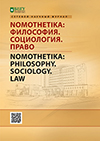Stress, health self-assessment and socio-psychological age of female personnel: organizational and cultural aspect
DOI:
https://doi.org/10.18413/2712-746X-2020-45-2-247-258Keywords:
industry 4.0, innovations, personnel, age stereotypes, gender stereotypes, organizational culture, stress, health, chronological age, socio-psychological ageAbstract
The analysis of the position of women in the labor market in the face of changes in the technological structure and the effect of age-related stereotypes is given. The results of an empirical study of the socio-psychological age of female personnel (engineers and doctors) of the companies with different involvement in innovative processes are presented. In the study, R. Kessler’s distress test and author’s questionnaire, combining questions and direct scaling, were used as tools. It is shown that the socio-psychological age of personnel depends on the specifics of the organizational and cultural conditions and the characteristics of HR management in the implementation of innovations. The effects of stress during the introduction of innovations in an organizational culture of a hierarchical-clan type are revealed, which are manifested in fatigue, a deterioration in the self-assessment of health and age, and causing personnel resistance. Management evaluates the personnel in opposition significantly older than their chronological age. Female personnel in an organizational culture with a pronounced innovative component supports the innovative development vector, feels less tired, more healthy and young. Managers rate the age of the majority of the staff as young or correspondent to chronological one. Thus, a new basis for the age-related assessment of personnel by managers has been proposed – namely, characteristics not of chronological, but of socio-psychological age. Its basis is a value readiness to accept innovation.
Downloads
References
Бабинцев В.П., Ушамирский А.Э. 2018. Концепция субъектности молодежи как симулякр социологической науки. Научные ведомости БелГУ, 3(43): 414–419.
Гимпельсон В.Е. 2019. Возраст и заработная плата: стилизованные факты и российские особенности. Экономический журнал ВШЭ, 2(3):185–237.
Григорьева И.А. 2018. Пожилые женщины: «вниз по лестнице» возраста и гендера. Женщина в российском обществе, 1(86): 5–18.
Захарова Л.Н., Леонова И.С., Коробейникова Е.В. 2017. Психологическая жизнеспособность персонала российских предприятий. Н. Новгород, ННГУ, 412 с.
Захарова Л.Н., Леонова И.С., Мартьянова Т.В. 2018. Гендерные проявления социально-психологического возраста персонала предприятий с организационной культурой разного типа. Проблемы теории и практики управления, 7: 107–117.
Клименко Л.В., Посухова О.Ю. 2017. Гендерные аспекты прекариатизации труда в российском обществе. Женщина в российском обществе, 1: 29–40.
Климов Е.А. 2004. Психология профессионального самоопределения. 2004. М., Издательский центр «Академия», 304 с.
Bowman D. 2014. Statistical representations and stereotypes of youth labor market participation. Insights from Australia. ResearchGate. Conference Paper. July. [Electronic resource]. URL: https://www.researchgate.net/publication/268107501_Statistical _Representations_and_Stereotypes_of_Youth_Labour_Market_Participation_Insights_from_Australia (accessed 30 January 2020).
Brettel M., Chomik C., Flatten T.C. 2015. How organizational culture influences innovativeness, proactiveness, and risk‐taking: fostering entrepreneurial orientation in SMEs. Small Business Management, 4(53): 868–885.
Caesens G., Stinglhamber F., Demoulin S., De Wide M. 2017. Perceived organizational support and employees’ well-being: the mediating role of organizational dehumanization. European Journal of Work and Organizational Psychology, 4(26): 527–540.
Castellano N., Rocca A., Read R. 2019. Analyzing the gender gap in European labor markets at the NUTS-1level. Cogent Social Sciences, 1(5). [Electronic resource]. URL: https://doi.org/10.1080/23311886.2019.1595294 (accessed 17 February 2020).
Cameron K.S, Quinn R.E. 2011. Diagnosing and changing organizational culture. Based on the competing values framework. Third ed. San Francisco: Jossey-Bass, 209 р.
Desmidt S., Prinzie A. 2019. Establishing a mission-based culture: analyzing the relation between intra-organizational socialization agents, mission valence, public service motivation, goal clarity and work impact. International Public Management Journal, 4(22): 664–690.
Fossen F., Sorgner A. 2019. Mapping the future of occupations: transformative and destructive effects of new digital technologies on jobs. Foresight and STI Governance, 2(13): 10–18.
Global Innovation Index 2019. 12th Edition / Eds S. Dutta, B. Lanvin, S. Wunsch-Vincent. Cornell SC Johnson College of Business. 2019. [Electronic resource]. URL: https://www. globalinnovationindex.org/gii-2019-report (accessed 04 February 2020).
Heilman M.I. 2012. Gender stereotypes and workplace bias. Research in Organizational Behavior, 32: 113–135.
Kessler R.C., Andrews G., Colpe A. 2002. Short screening scales to monitor population prevalence and trends in non-specific psychological distress. Psychological Medicine, 32: 959–956.
Kucherov D.G., Zamulin A.L., Tsybova V.С. 2019. How young professionals choose companies: employer brand and salary expectations. Russian Management Journal, 1(17): 29–46.
Magalhaes J.P., Passos J.F. 2018. Stress, cell senescence and organismal ageing. Mechanisms of Aging and development, 170: 2–9.
Posthuma R.A. 2009. Age stereotypes in the workplace: common stereotypes, moderators, and future research directions. Journal of Management, 1(35): 158–188.
Staudinger U.M. 2015. Images of aging: Outside and inside perspectives. Annual Review of Gerontology and Geriatrics, 1(35), 1: 187–210.
Abstract views: 735
Share
Published
How to Cite
Issue
Section
Copyright (c) 2020 NOMOTHETIKA: Philosophy. Sociology. Law

This work is licensed under a Creative Commons Attribution 4.0 International License.


